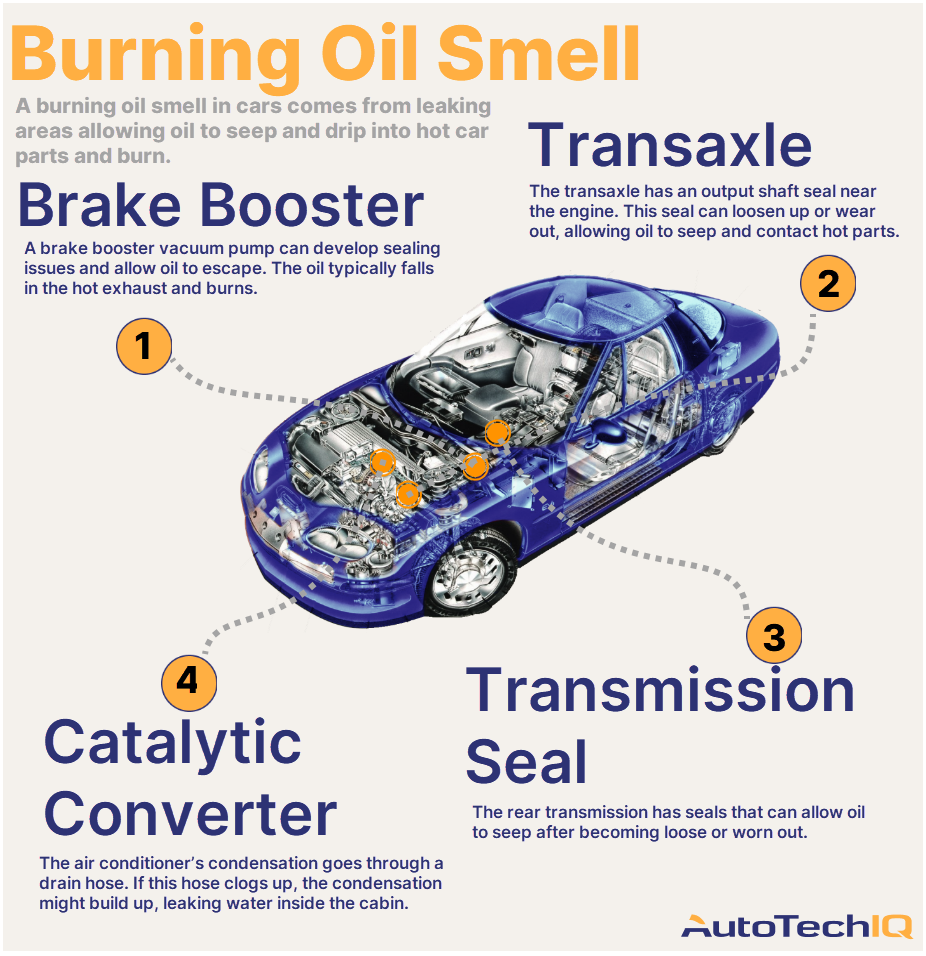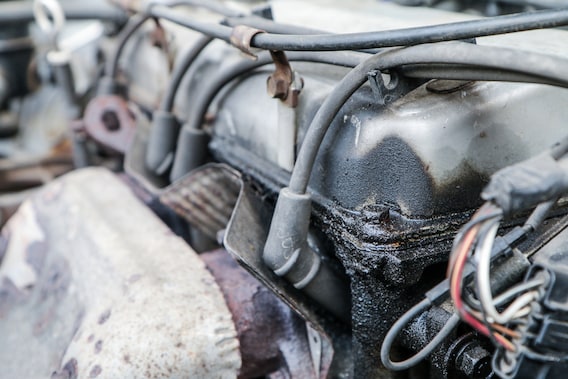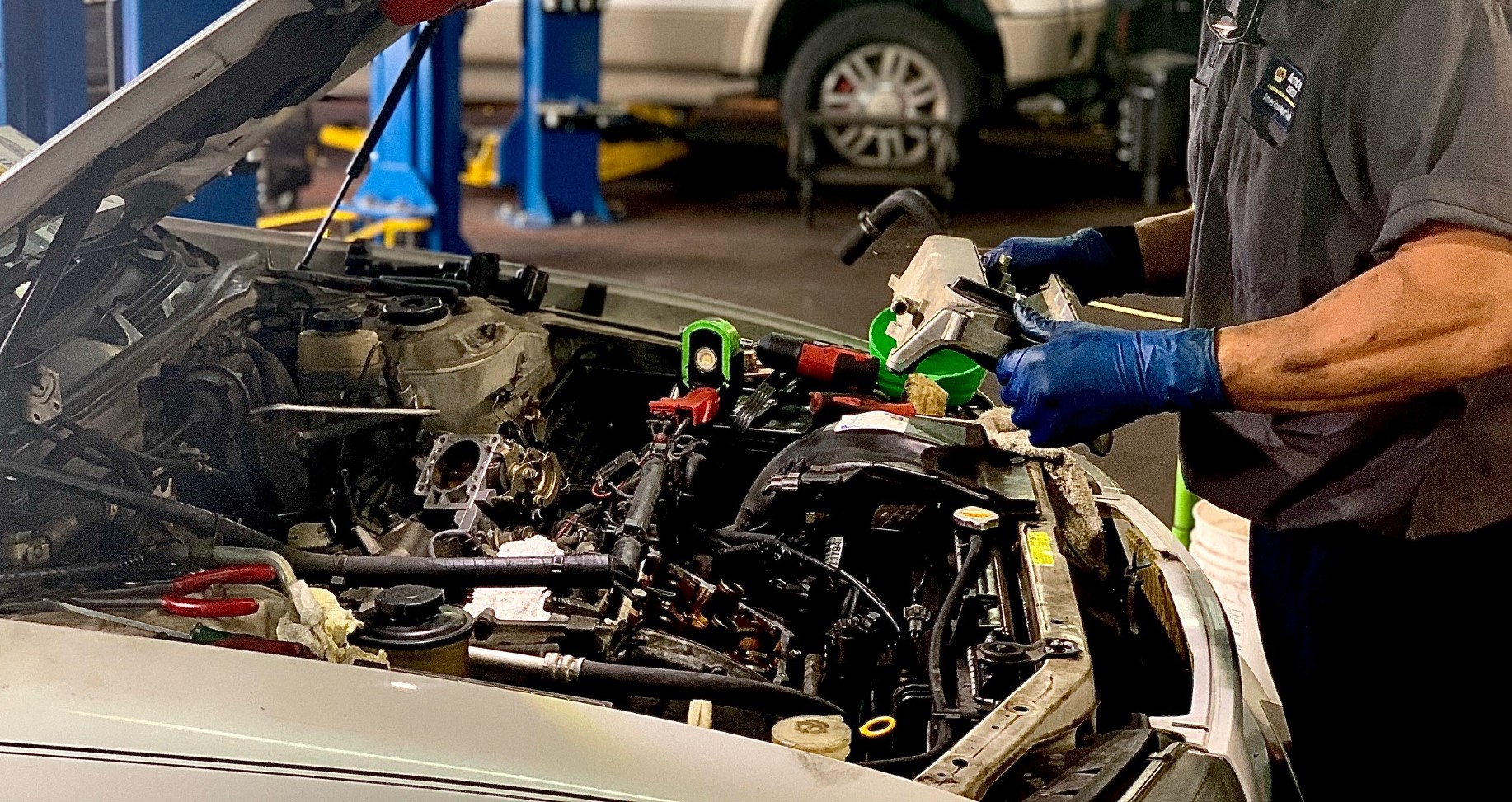Engine oil smelling like burning oil indicates a potential issue with the engine’s lubrication system. This can be caused by overheating, oil leaks, or a clogged oil filter.
When left unchecked, burning oil can lead to serious engine damage and costly repairs. It is important to identify and address the root cause of the issue as soon as possible. Regular oil changes and routine maintenance can help prevent burning oil and other engine problems.
If you notice a burning oil smell, it is recommended to have your vehicle inspected by a qualified mechanic to avoid further damage and ensure safe driving.

Credit: www.autotechiq.com
Read More: Select Why is My 2016 Kia Optima Burning Oil?
Introduction To Engine Oil Odors
When it comes to maintaining your vehicle, one of the key signs that something may be amiss with your engine is the distinct smell of burning oil. Engine oil odors can indicate a variety of potential issues, and being able to recognize and address them early can save you from costly repairs down the line. In this section, we’ll explore the distinctive smell of burning oil, how to recognize it, and the initial steps to take before diving into diagnostics.
Recognizing The Smell Of Burning Oil
If you catch a whiff of a pungent, burnt aroma while driving or after parking your car, it could be a sign that your engine oil is overheating or leaking. The smell is often likened to that of something burning or charring, indicating a potential problem within the engine. It’s crucial to address this odor promptly to prevent any further damage to your vehicle’s engine and ensure its longevity.
Initial Steps Before Diagnostics
Before diving into extensive diagnostic procedures, there are a few initial steps you can take to investigate the source of the burning oil smell. Start by checking your vehicle’s oil level and condition. Ensure that the oil level is within the recommended range and inspect the oil for any signs of contamination or degradation. Additionally, inspect the engine and its components for any visible oil leaks or seepage. These initial checks can provide valuable insight into the potential cause of the burning oil odor, guiding your next steps in addressing the issue.
Common Causes Of A Burning Oil Smell
Engine oil is an essential component that helps lubricate the engine’s moving parts and prevent wear and tear. However, when you notice a burning oil smell coming from your car, it can be an indication of a problem. The smell can be strong and unpleasant, making driving uncomfortable. Here are some common causes of a burning oil smell:
Oil Leak Onto Hot Engine Parts
If there is an oil leak in your engine, the oil can drip onto the hot engine parts, such as the exhaust manifold or cylinder head. This can cause the oil to burn and produce a distinct smell. The oil leak could be caused by worn-out engine gaskets, damaged oil pan, or a damaged valve cover gasket. If left unattended, the oil leak can lead to engine damage.
Worn Out Engine Gaskets
The engine gaskets play a crucial role in preventing oil from leaking out of the engine. Over time, the gaskets can wear out and develop cracks or gaps, leading to oil leaks. When the oil leaks onto the hot engine parts, it can cause a burning oil smell. It’s essential to have the gaskets replaced as soon as possible to prevent further damage to your engine.
Overfilled Engine Oil
Adding too much oil to your engine can cause it to burn and produce a burning oil smell. Overfilled engine oil can also cause damage to the engine, such as foaming and reduced lubrication. It’s crucial to check your engine oil levels regularly and add the recommended amount.
If you notice a burning oil smell coming from your car, it’s essential to have it checked by a mechanic as soon as possible. Ignoring the problem can lead to serious engine damage and costly repairs.
Leak Detection And Repair
If you notice that your engine oil smells like burning oil, it could be an indication of an oil leak. Ignoring this issue can lead to serious engine damage and potential safety hazards. To prevent further complications, it is crucial to promptly detect and repair any oil leaks in your vehicle.
Visual Inspection For Oil Leaks
Performing a visual inspection is the first step in identifying oil leaks. Here’s how you can conduct a thorough visual inspection:
- Check the engine compartment for any visible signs of oil leakage such as oil stains or puddles.
- Inspect the oil filter and drain plug for tightness and signs of leakage.
- Examine the gaskets and seals in the engine for any cracks or damage.
- Inspect the oil pan for any dents or punctures that could be causing the leak.
By visually inspecting these components, you can identify potential areas where oil leaks may be occurring.
Using Leak Detection Dye
If the visual inspection does not reveal any obvious leaks, you can use a leak detection dye to pinpoint the source of the oil leak. Follow these steps to use a leak detection dye:
- Add the leak detection dye to your engine oil.
- Run the engine for a short period to allow the dye to circulate.
- Use a UV flashlight or lamp to scan the engine compartment for any areas where the dye is visible.
- Note the location of the dye and identify the specific component that requires repair or replacement.
Using a leak detection dye can help you identify even the smallest oil leaks that may not be visible to the naked eye.
Sealing And Replacing Components
Once you have identified the source of the oil leak, it is essential to take appropriate measures to seal or replace the faulty component. Here are some common repair methods:
- If the leak is due to a loose or damaged gasket, replace the gasket to prevent further leakage.
- If the oil pan is damaged, consider replacing it with a new one.
- In case of a leaky oil filter, tighten it properly or replace it with a new filter.
- If the leak is coming from a seal, such as the valve cover gasket, replace the seal to stop the oil leakage.
By sealing or replacing the faulty components, you can effectively repair the oil leak and restore the proper functioning of your engine.
Remember, addressing oil leaks promptly can save you from costly repairs and potential engine damage. Regularly inspecting your vehicle for oil leaks and taking necessary repair measures will ensure the longevity and performance of your engine.

Credit: www.chryslerjeep24.com
Gasket Issues And Solutions
When it comes to engine oil smells like burning oil, one of the potential culprits could be faulty gaskets. Gaskets are essential components that create a tight seal between different engine parts, preventing leaks and maintaining proper pressure. However, over time, gaskets can wear out or become damaged, leading to oil leaks and the characteristic burning oil smell. In this section, we will explore how to identify faulty gaskets and the process of replacing them.
Identifying Faulty Gaskets
Faulty gaskets can manifest in various ways, and it’s important to be able to identify the signs. Here are some common indicators that your gaskets may be the source of the burning oil smell:
- Visible oil leaks around gasket areas
- Excessive oil consumption
- Engine overheating
- White smoke from the exhaust
If you notice any of these symptoms, it is crucial to inspect your gaskets to determine if they need replacement. Ignoring faulty gaskets can lead to more significant engine problems and costly repairs in the long run.
Gasket Replacement Process
Replacing faulty gaskets requires careful attention to detail and a systematic approach. Here is a step-by-step process to guide you:
- Identify the specific gasket(s) causing the issue
- Gather the necessary tools and materials for the replacement
- Drain the engine oil and coolant to access the gaskets
- Remove the components obstructing the gasket(s)
- Inspect the gasket area for any debris or damage
- Clean the surfaces thoroughly to ensure a proper seal
- Apply a high-quality gasket sealant to the new gasket(s)
- Carefully position and install the new gasket(s)
- Reassemble the components and tighten the bolts to the specified torque
- Refill the engine oil and coolant to the recommended levels
- Start the engine and check for any leaks or abnormal sounds
By following these steps and taking your time, you can effectively replace faulty gaskets and eliminate the burning oil smell. However, if you are not confident in your mechanical skills, it is always advisable to seek professional assistance to ensure the job is done correctly.
Managing Overfilled Engine Oil
Symptoms Of Overfilled Oil
If the engine oil is overfilled, it can lead to several noticeable symptoms, including:
- Excessive oil consumption
- Oil leaks
- Increased oil pressure
- Engine misfires
- White smoke from the exhaust
Corrective Measures For Overfill
When you realize the engine oil has been overfilled, it’s important to take immediate corrective measures. Here are some steps to address overfilled oil:
- Check the oil level and drain excess oil if necessary
- Inspect for any damage caused by overfilled oil
- Monitor the oil level regularly to prevent overfilling in the future

Credit: www.americanimportrepair.com
Preventive Measures
Preventive measures play a crucial role in maintaining your engine oil quality and preventing burning oil smells. By following the right steps, you can ensure your engine runs smoothly and efficiently.
Regular Maintenance Tips
Regular maintenance is key to preventing engine oil from smelling like burning oil. Make sure to change the oil as per the manufacturer’s recommendations.
Checking Oil Levels Correctly
Regularly check your oil levels using the dipstick method to ensure they are within the recommended range.
When To Seek Professional Help
If your engine oil smells like burning oil, it’s crucial to seek professional help immediately. This could indicate a serious issue that needs expert attention to prevent further damage. Don’t delay in getting your vehicle checked by a qualified mechanic.
When to Seek Professional Help: Complex Diagnostics Finding a Trusted Mechanic
Complex Diagnostics
If the burning oil smell persists. Mechanics can perform in-depth tests. Identify the root cause accurately.
Finding A Trusted Mechanic
Research local repair shops online. Look for customer reviews and ratings. Ensure the mechanic has experience. Seek help promptly for burning oil smells. Complex diagnostics may be necessary. Finding a trusted mechanic is crucial.
Conclusion: Ensuring Engine Health
To ensure engine health, it’s important to address the issue if your engine oil smells like burning oil. This odor may indicate potential problems with the engine that need to be addressed promptly to prevent further damage. Regular maintenance and inspections can help identify and resolve issues early on, keeping your engine in good condition.
Start of HTML code
Summary Of Key Points
H3 heading: Summary of Key Points
Identifying burning oil smell in engine oil can indicate potential issues.
Check for leaks, worn-out gaskets, or overheating causing the burning smell.
The Importance Of Timely Action
H3 heading: The Importance of Timely Action
Addressing burning oil smell promptly prevents major engine damage.
Regular maintenance and immediate repairs ensure engine longevity.
H3 heading: Conclusion: Ensuring Engine Health
Proper maintenance and swift action are crucial for optimal engine performance.
Regular inspections and timely repairs safeguard your engine’s health.
End of HTML code
Frequently Asked Questions
Why Does My Engine Oil Smell Like Burning Oil?
When engine oil smells like burning, it could indicate a leak, overheating, or old oil. Check for leaks and ensure the oil level is correct. Overheating can cause the oil to burn. If the oil is old, it may have become contaminated and need to be changed.
What Are The Possible Causes Of Burning Oil Smell In The Car?
A burning oil smell in the car may be caused by an oil leak, a damaged engine component, or a clogged oil filter. It can also result from overheating or driving with too little oil. Have a mechanic inspect the vehicle to determine the exact cause.
Is It Safe To Drive If My Engine Oil Smells Like Burning Oil?
If you notice a burning oil smell, it’s best to avoid driving the car until the issue is resolved. Continuing to drive with a burning oil smell could lead to serious engine damage. Have the vehicle inspected by a professional to ensure it’s safe to drive.
Conclusion
If your engine oil smells like burning oil, it could indicate serious issues. Regular maintenance and prompt action are key to preventing costly repairs. Always consult a mechanic for proper diagnosis and solution to avoid long-term damage to your vehicle.
Stay proactive for a smooth-running engine.


